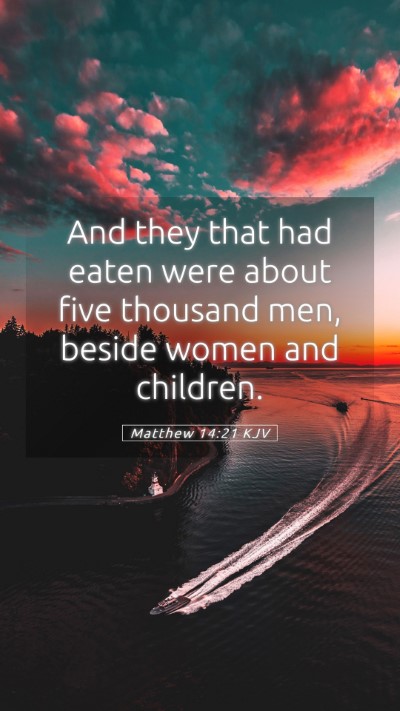Bible Verse Commentary on Matthew 14:21
Bible Verse: Matthew 14:21 states, "And they that had eaten were about five thousand men, beside women and children."
Overview
This verse captures the account of Jesus’ miraculous feeding of the 5,000, emphasizing not only the magnitude of the miracle but also the compassion of Christ and His ability to provide abundantly. In the context of Bible verse meanings and interpretations, Matthew 14:21 serves as a profound example of Jesus' ministry and the nature of His miracles.
Biblical Exegesis
According to Matthew Henry, this event highlights the power of Jesus and His deep concern for the physical as well as spiritual needs of humanity. This miracle is not just about the provision of food; it serves a greater purpose of demonstrating Jesus' divine authority and compassion. The significant number of people being fed symbolizes His ability to cater to vast multitudes, reflecting the inclusivity of His message.
Albert Barnes elaborates that the feeding of the 5,000 foreshadows the spiritual nourishment that Christ would provide. The detailed mention of "beside women and children" emphasizes that the count of 5,000 only includes men, suggesting that the total number of those fed was even larger. This aspect underscores the idea that Jesus' ministry was open to all, regardless of gender or social status.
Adam Clarke notes the logistical challenge of feeding such a large crowd and how this miracle exemplifies God's sufficiency in meeting our needs. Moreover, it sets the stage for understanding the sacramental nature of Jesus’ later teachings about being the Bread of Life. This event compels believers to reflect on God's provision in their own lives.
Key Insights from Public Domain Commentaries
- Divine Provision: Jesus' miraculous provision illustrates God's willingness to meet both physical and spiritual needs.
- Compassionate Leadership: Jesus exemplifies a model for leaders by caring for the well-being of the people.
- Inclusion: The mention of "women and children" signifies that Jesus' ministry transcends boundaries.
- Symbolism of Bread: This miracle serves as a precursor to Christ’s discourse on Him being the Bread of Life (John 6:35).
Application of This Verse
In understanding Scripture and applying Bible verses to daily life, Matthew 14:21 invites believers to reflect on God’s provision and encourages them to share their blessings with others. The miracle prompts one to not only trust in God's ability to provide but also to act in compassion towards those in need.
Cross References
- John 6:1-14: The parallel account of Jesus feeding the 5,000.
- Mark 6:30-44: Another Gospel's perspective on the feeding of the multitude.
- Luke 9:12-17: Luke's depiction of the same miracle with key details.
- Matthew 15:32-39: The feeding of the 4,000, further illustrating Jesus' compassion.
- John 6:35: Jesus as the Bread of Life, connecting to the significance of the miracle.
Conclusion
The significance of Matthew 14:21 extends beyond the immediate miracle; it encapsulates themes of provision, compassion, and inclusivity in Jesus' ministry. Through a thorough understanding and interpretation of this scripture, believers can gain valuable insights for their Bible study groups, online Bible study courses, and personal reflections. The teachings derived from this verse show how Jesus meets both the physical and spiritual needs of His followers, encouraging them to trust in Him and extend that same compassion to others.


